In this episode of the Healthtech Marketing Show, Karsten Russell-Wood, the Chief Marketing and Experience Officer of Equum Medical and I talked Rural Health.
For a city boy like me, this was an excellent education.
Listen to the Episode
Rural Health is a Misunderstood Market
According to Karsten, the healthcare segment is misunderstood. It’s not all corn stalks and stethoscopes. There are wide-ranging differences across the country, from semi-affluent suburban locales to poorer desert communities.
 Rural Health consists of 1,300 critical access beds and accounts. The American Hospital Association (AHA) has created a nice downloadable infographic summarizing key data. (Sorry, it’s a little old). The problem is that the Rural Health population is underserved. Rural Health covers 15% of the US population but is only served by 10% of US providers. And access to specialists is even worse. This is compounded by the difficulty in attracting and retaining providers.
Rural Health consists of 1,300 critical access beds and accounts. The American Hospital Association (AHA) has created a nice downloadable infographic summarizing key data. (Sorry, it’s a little old). The problem is that the Rural Health population is underserved. Rural Health covers 15% of the US population but is only served by 10% of US providers. And access to specialists is even worse. This is compounded by the difficulty in attracting and retaining providers.
As a result, many Rural Health organizations face even worse financial challenges than more extensive, urban, and suburb-based systems. According to Karsten, 30% face financial close in the next five years.
Virtual Care Is a Savior
Thankfully, the expansion of virtual care such as telehealth and remote patient monitoring are filling some of the gaps in patient care. It means thousands of patients get the care they need from otherwise unavailable specialists.
Companies like Karsten’s firm Equum Medical provide these specialists. They offer acute care provider services from admission to discharge, including specialists like pulmonologists, cardiologists, and infectious disease physicians. They partner with technology vendors like Caregility to do this, which allows rural hospitals to offer more services and retain patients locally.
Rural Health Takes a Different Approach
In the episode, Karsten shared insights about how to sell to Rural Care organizations.
The first thing is to realize that these organizations are seen as cornerstones of the community. They are as crucial to the sustainability of these communities as banks and post. Rural Health CEOs are often deeply invested in community well-being and seen as influential leaders of their communities. Their decisions can impact entire communities, not just the hospital.
Because of these deep community ties, the CEOs may be even more important to reach than they are in larger healthcare systems, where buying decisions are delegated and more decentralized. Peer recommendations are highly valued in rural healthcare. Reputation and personal connections and relationships may be even more important than with larger healthcare organizations, where executive turnover is higher.
Watch the Episode
How to Market to Rural Health
Marketing to Rural Health organizations may require a lot more travel. Rural health conferences and events tend to be smaller, more focused, with 50-100 committed attendees. But they can be even better marketing opportunities than the big shows like HIMSS and ViVE. Attendees often have decision-making authority, and there is an even greater opportunity for in-depth conversations and relationship-building.
Collaborative purchasing groups are also organized for rural hospitals. These groups address the lack of purchasing power compared with urban hospitals. For example, this has allowed for shared services and better pricing on telehealth resources.
Education is valued even more. Karsten shared there is still a high need for education about telehealth among rural administrators, providers, and patients. There are still varying levels of telehealth knowledge and acceptance in rural areas. They have created educational content focused on benefits and ease of use. This helps to build trust in telehealth services among all stakeholders.
Not Just Marketing To But Marketing For
Karsten shared that Rural Health organizations tend to need help with marketing to their patients greatly. As a result, his team provides marketing support services to their rural hospital customers. They provide help with content creation, digital media, and telehealth promotion. This reduces the burden on limited in-house marketing staff. They have developed skills in using local media channels like radio and newspapers. In addition,
One thing I found especially interesting is how important Facebook is for marketing to rural healthcare consumers and buyers of technology and services. Many rural hospital administrators and older patients use Facebook. It is effective for chronicling hospital community involvement with patients, building brand credibility, and announcing new services.
——
The Rural Health market is not the faint of heart. I came away realizing that many dismiss it to readily and by investing in defining a tailored strategy firms like Equum Medical are delivering disproportionate value and generating profitable revenue.

